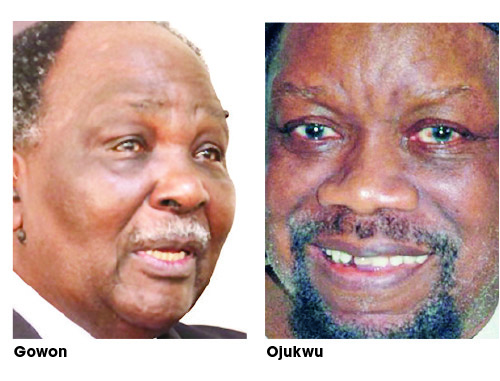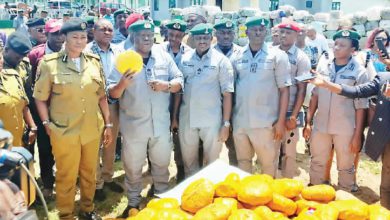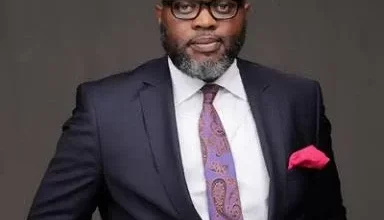
- Musa told Daily Sun that “the tendency of Nigeria fighting another war “is quite obvious.”
This week, precisely on Wednesday, January 13, echoes of the Nigerian Civil War, reverberated like never before in the country. Though it was nationally glossed over as the Federal Government did nothing to commemmorate the sad event but it was impossible for many to suppress the memories. In some parts of Nigeria and particularly Lagos which was the nation’s capital during the ugly era, prominent Nigerians literally embarked on a journey of sober reflection.
At the Muson Centre, Onikan, Lagos, an event was packaged to mark 50 years of the war. It was organised by Nzuko Umunna and Ndigbo Lagos in collaboration with Civil society organisations under the theme, ‘Never again Conference Nigerian Civil war: 50 Years After’.
Particularly in the South East and other states with Igbo speaking natives, this week is indeed for obvious reasons one of sober reflection as they remembered the loss of loved ones who died either in the war front or from hunger and starvation. And for particularly those who were old enough to witness the gory event, the images of the war which left more than 2.5 million people dead would not be forgotten in a hurry especially as it would appear that no lessons were learnt from the unfortunate era. But Edmund Burke, the Anglo-Irish statesman, political theorist, and philosopher wrote that, “Those who don’t know history are doomed to repeat it.”
Prominent Nigerians including Second Republic Governor of Kaduna State, Alhaji Balarabe Musa, Chairman Yoruba Council of Elders (YCE), Prof Banji Akintoye, Chief Goddy Uwazuruike, a former President of Aka Ikenga and Prof Anya O. Anya, lamented that the prevailing situation in Nigeria today are similar to those of the months leading to the war and warned that the country risked being plunged into a similar experience.
Musa told Daily Sun that “the tendency of Nigeria fighting another war “is quite obvious.”
He said, “We can see the same kind of situations which led to the 1966 coup and the subsequent destabilisation of the system is present in the negative state of affairs of Nigeria today. The situation that led to the 1966 coup was the Wild Wild West, which arose from the separatist tendencies in the South West and the domination of political affairs by the North. The problem in 1966 was due to the struggle for supremacy between the South West and the North. We are seeing the same situation now. The ruling All Progressives Congress (APC) government is an alliance between the ruling elite in the North and the elite in the South West.”
President of Alaigbo Development Foundation (ADF), Professor Uzodinma Nwala also in a paper he presented at a conference on “Memory and nation building: BIAFRA 50 years after- A sober reflection”, said: “before we can talk about reconciliation, we must accept that grave wrongs were done to the Biafrans, before, during and since the end of the war.”
Even though the then Head of State of Nigeria, General Yakubu Gowon, had declared that there was no victor, no vanquished in the war, Nwala maintained, the people of the defunct Republic of Biafra were vanquished, saying that nobody among the victorious side had cared about reconciliation with the Igbo.
Nwala said: “In pursuing the lessons of the retributive post-war treatment of the Biafrans, I would ask the leaders on the victorious side the following questions–
“When you took all their financial deposits in the banks and paid them only £20 (twenty pounds), what did you expect the result to be – pacification, conciliation or to have them permanently weakened?
“When you allowed massacre of unarmed soldiers and leaders even when they had declared their return to Nigeria, what did you expect? I mean when you murdered Prof. Kalu Ezera or when you killed unarmed Col Onwuatuegwu in cold blood, what did you expect?
“When you killed and also buried alive, thousands of innocent civilians in Asaba, was that a circus show?
“Yes, post-Biafra was not attended by any genuine efforts to seek reconciliation nor even to find out what led to the war. Rather, what we have witnessed is decades of vengeance, arrogance and conspiracy against Alaigbo and Ndigbo.”
Respondents named the atrocities against the Igbo after the civil war to include, dismissal of civil servants, secret execution of some of their officers, seizure of Igbo property in the name of ‘abandoned property’; punitive boundary adjustments to make them landlocked and excise the rich oil deposits in their land.
Others were closure of the Eastern seaport and railway lines; deliberate policy of encirclement of Alaigbo, inciting Igbo outside Igbo heartland to renounce their Igbo identity; deliberate policy of exclusion from the governance and power equation in Nigeria, deliberate policy of destroying Igbo businesses, continued massacre, lynching of Igbo in many places in the North and no serious effort at post-war reconstruction and reconciliation.
Traditional ruler of Ehere autonomous community in Obingwa Local Government of Abia State, Eze Young Nwangwa, said he was in Form 3 in secondary school when the war broke out in 1967 and had to join the Biafran army straight from school.
He said: “The war ended in early 1970 and the Head of State then, General Yakubu Gowon made a pronouncement of ‘No victor, No vanquished’. But I can tell you that that pronouncement was tested to the contrary when immediately after the war, any Igbo man that had whatever amount of money was asked to deposit it in the bank and was given 20 Pounds in return. Even when they said the war had ended, the Nigerian troops were vandalizing everywhere in Igbo land, raping our women and doing all odd things, yet we were on the platform of no victor, no vanquished. In other words, I can vividly say that the Igbo suffered a lot during the war”.
Like Eze Nwangwa, Pa Patrick Onwuasoanya, a veteran Biafran soldier, lamented that the Igbo were inflicted with serious wounds during the war and nothing concrete had been done to heal the wound.
He said: “The Igbo suffered excessively during the war that they needed serious programme from the Federal Government to rehabilitate them thereafter. Even the much touted “Rs” programme was not implemented in any way as the Igbo were allowed to suffer after the war. The infrastructure in the South East is nothing to write home. it’s equally in the South East that people including primary school pupils were made to contribute money to build an airport as was the case with Owerri airport.”
Elder statesman, Chief Emmanuel Iwuanyanwu, regretted that Biafra phobia could not allow the Nigerian Government take advantage of the scientific advancements made by Biafra during the war.
Push for the Federal Government to create an institution to house the Biafra scientists and their great inventions petered away because doing so would give credit to the Biafrans.
In March 2018, the then Minister of Communications, Adebayo Shittu had tasked the Federal Government to trace innovators of the defunct Biafra who were still alive for them to deploy their technological know-how towards the nation’s drive for industrialisation.
The minister regretted that the nation failed to take advantage of the innovations propelled by the civil war, by making use of those he described as great minds that sustained the then Biafra army.
Shittu, who spoke at the commissioning of Technology Orientation Centre, built by the National Agency for Science and Engineering Infrastructure (NASENI), at Idu, Abuja, urged the agency to go beyond the elite environment and trace these innovators, most of whom did not even have university education.
An economist and political scientist, Professor Ebere Onwundiwe, said the mismanagement of the General Yakubu Gowon’s Reconciliation, Reconstruction and Rehabilitation (3Rs) policy, which the military government put in place to erase the scars of war, was the major reason for the resurgence of Biafra uprisings.
At a conference with the theme “Memory and Nation Building: 50 years after Biafra” in Abuja in 2017 and sponsored by the Ford Foundation, Open Society Initiative for Africa (OSIWA) and the Shehu Musa Yar’Adua Foundation, he said: “It was the failure of Nigeria to vigorously and successfully implement the Three Rs policy that was partly responsible for the establishment of Movement for the Actualization of the Sovereign State of Biafra (MASSOB) and Independent People of Biafra (IPOB).
War as catalyst
Unfortunate as the Civil War was, it is not an excuse for the South East to surrender to fate. According to former Director General of the Nigeria Economic Summit Group, Prof. Anya O Anya, the loss of the civil war did not have to be a defeat.
He said, “Our situation is not unique. Other countries have gone through this. For example, some historians suggest that because of the reparation and other post war injustices the Germans thought was imposed on them, that was why they were involved in the Second World War.
“Germany fought the World War and Lost. Japan fought the World War and lost. But in less than 40 years, Germany became the largest economy in Europe, stronger than the economies of the winners. Japan was the second largest economy after the United States until the miracle of China started. In other words, losing a war does not necessarily mean you are a badge of failure. “We would have become pace setters if we learned from our past. But we have not learnt lessons from our past.”
“Nigerians have to reflect on the past. Take the Eastern Nigeria region for example, some works by some economists at the at Michigan State University have said Eastern Nigeria was the fastest growing industrial area in the whole world. They didn’t say in Africa. They said in the whole world.
Biafra war in Brief
People of the old Eastern region of Nigeria, were taken aback when on July 6, 1967, they woke up to deafening sounds of mortars, bombs, shelling and other military hardware, with thick smoke all over the entire region. The Federal Military Government of Nigeria had taken war to the doorsteps of Republic of Biafra in what later became the Nigerian Civil War. Between July 6, 1967 and January 15, 1970, the people of the old Eastern region, particularly the Igbo, were engaged in a fratricidal war with Nigeria.
Generally, it is believed that the war was the culmination of a series of events that happened prior to 1967.
Some people believe that these series of event were set off by the selfish ambition of a few men with more zeal than foresight. The calculation is that the January 15, 1966 coup d’état led by Major Chukwuma Kaduna Nzeogwu planted the seed that germinated to the civil war.
The January 15, 1966 coup led to the death of about 30 political leaders including Nigeria’s Prime Minister, Sir Abubakar Tafawa Balewa, the Northern Premier and Sarduana of Sokoto, Sir Ahmadu Bello, Chief Samuel Ladoke Akintola as well as top military officers from the North and West. To them, it was an Igbo coup because the then President, Nnamdi Azikiwe of Igbo extraction, and the Premier of the Eastern region were not killed. Many others who held the 1966 coup in mind as being master-minded by the Igbo did so because Nzeogwu was perceived to be an “Igbo soldier” and he led the coup. Thus, they believe the coup was orchestrated by the Igbo to dominate the rest of the country.
They point to the fact that the inability of Gen Aguiyi Ironsi, who eventually became Head of state after the coup to arrest those involved and put them on trial further widened the mistrust that existed between the Igbo and the North.
Again, Ironsi did not help matters when on May 24, 1966, he promulgated the unification decree which gave birth to the pseudo-federal structure. He annulled the federal system of government and imposed a unitary system, a move many believe, has stunted the country’s political development ever since.
The argument is that Ironsi’s inability to read the political atmosphere made it possible for a counter revenge coup of July 29, 1966, by Northern officers made up of Muslims and Christians, in which he was killed.
On 29 July 1966, Northern officers carried out a countercoup in which 240 Southern officers and men, three-quarters of whom were Igbo, including Ironsi, as well as thousands of civilians of Southern origin living in the North were systematically killed. Gen Ironsi’s death led to the emergence of Gen Gowon as the Head of State.
The foundation for the war was laid when Gowon emerged and as all these were happening, there was an ongoing massacre widely spread in the North and by the time the pogrom ended, virtually all Igbo in the North were either dead, hiding among sympathetic Northerners or on their way to the Eastern region. The massacre shockingly was led by the Nigerian Army and replicated in various Northern Nigerian cities. Although Colonel Gowon was issuing guarantees of safety to Southern Nigerians living in the North, the intention of a large portion of the Nigerian army at the time was genocidal as was the common racist rhetoric among Tiv, Idoma, Hausa and other Northern Nigerian tribes. With the exception of few Northern Nigerians, mainly army officers who were not convinced that Igbo were innately evil, the Southern and Eastern Nigerians were generally regarded at the time in the North as described by Charles Keil, ‘The Igbo and their ilk…vermin and snakes to tread underfoot…dogs to be killed.’
Between July 29, 1966, when the counter coup took place, and September 1966, approximately 30,000 Igbo were killed in the North. Some Northerners were also killed in backlashes in Eastern cities. It was reported that an estimate of between 80,000 and 100,000 Igbo living in the North were killed before the war in 1967, leading to mass exodus back to the East.



